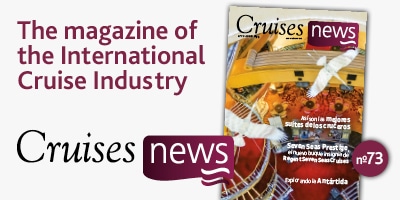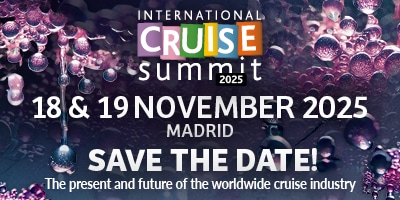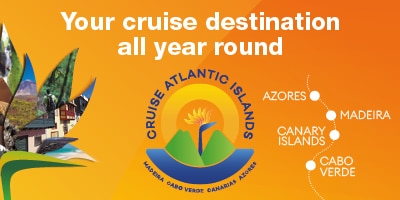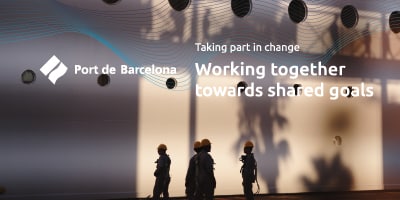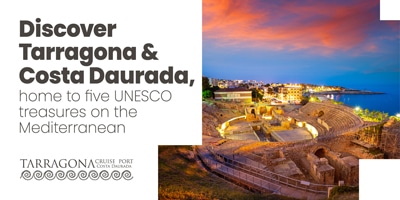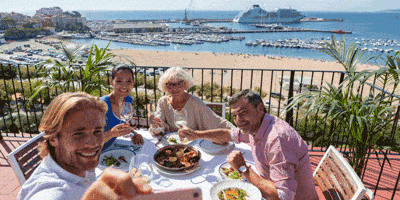Interview with Michael McCarthy, Chairman Cruise Europe
Cruise Europe is a business to business network of cruise ports and destinations in Northern & Atlantic Europe. They represent more than 140 members in over 20 countries.
 With a rapidly growing cruise industry, and considering what all this involves in terms of infrastructure and regulations, from Cruise Europe’s point of view, what is the role of the various organizations and associations in this sector at this very critical moment?
With a rapidly growing cruise industry, and considering what all this involves in terms of infrastructure and regulations, from Cruise Europe’s point of view, what is the role of the various organizations and associations in this sector at this very critical moment?
The role of the various organisations and associations is now more critical than ever. We need to enhance a proactive and objective message to ensure our communications serves to preserve and protect this incredible industry. The cooperation between all the associations has never been as strong and follows a decision by Cruise Europe to sign an MOU with ESPO and all the regional associations in 2014. Over the last four years the executive of CLIA Europe have engaged with the associations in a very proactive way which will work to all our benefit during this unprecedented and catastrophic pandemic for so many in society as well as business. It is life changing in many ways.
“The future depends on what you do today” Mahatma Gandhi.
One of the most important aspects of the industry is to establish a prompt and unified environmental response that involves all stakeholders, including associations like CE and CLIA. How do you view this challenge in Cruise Europe?
Environmental sustainability is an essential part of the ports and shipping business case. All modes of transport and shipping, are under the Climate Change microscope. The Cruise Industry has no option but to be “above compliant” with all International Regulations to survive and in particular the Paris Declaration of December 2015- the Global focus on responsible marine environmental stewardship. Cruise Europe and all the associations have a role with CLIA in shifting the narrative in a positive way and earn a greater share of publicity for all the positive initiatives the cruise industry is doing. There is no doubt that the “visibility” of a large ship or multiple ships in a City port adds to concern but again, it is important to keep in balance that the volume of cruise passengers versus land/flight generated visitors is generally less that 3-5% throughout all the ports in Europe.
However we need to put a “Frame of Reference” around sustainability and all the positive initiatives by creating a roadmap to disseminate this information, to the ports, public and the media, in partnership with the Cruise Lines and CLIA….
Do you think that this unified response would help to increase public awareness of the efforts being made to minimize the perception of negative impacts as “pollution”, both at sea and in ports?
First of all I never refer to “emissions” that are allowable under EU Legislation and IMO Regulations as “pollution” which again emphasises the need to coordinate “language” and various expressions in our industry, ports and media.
The unity of response is vital in order to communicate an agreed strategy. There is an obvious requirement for the Cruise Lines to share cruise tourism research and scientific results with stakeholders to assist in informed decision making. These challenges and discussions are already underway between CLIA, Cruise Lines and Ports/Associations to provide the required clarity. In addition, ports and regions have to establish ‘Sustainable Cruise Tourism Plans’ as the means for conveying the destinations vision for the future. This can be as formal tools for ensuring and certifying destination sustainability and providing impact transparency & reporting. The future for Cruise Europe ports and ports throughout the world is to create stakeholder awareness campaigns and debate workshops on the opportunities and local challenges of cruise tourism.
We also need to promote all the positive initiatives that the Cruise industry is undertaking from Advanced Wastewater Systems, LNG Fuel, Exhaust Gas Cleaning Systems (EGCS), Shore-side Power Capability and many more initiatives on board.
We have to be Open with our stakeholders and community to build Mutual Trust.
In most of the Cruise Europe associated ports the season has not yet started, so apparently, they have not been affected by the coronavirus crisis. But what do you think will be the impact of the coronavirus crisis during the coming summer?
Like most people in the world this rapidly spreading virus has caused uncertainty and vulnerability in every society in every country and the WHO and their best medical staff are scrambling to understand the virus and try and catch up with its meteoritic spread. I am no more qualified than the next person to predict what this will mean to our future and the future of cruise travel. The tourism sector has never before in my lifetime been impacted so heavily and so comprehensively.
Itineraries had already commenced in Northern Europe when the virus swept in. However due to negative press from the Far East in January and the depiction of a cruise vessel as “capturing” guests without being able to disembark, sent negative shockwaves throughout the world. This prompted National Governments to a “knee-jerk” reaction and ban cruise ships from docking. So much for a “safe port of refuge”.
Cruise Europe Ports are reviewing their contingency plans in relation to a coronavirus detection on a vessel scheduled to call to their ports and are working in cooperation with CLIA, where all information of known events in relation to the cruise industry is being notified. Cruise Europe will disseminate the latest updates immediately to all members”
Clearly this global crisis will change us and what we do and what I would like to convey is that it is our inter dependence as an industry that has made us develop and kept us strong for so long. It is these dependencies and connectivity that will help us emerge from this together.
We have previously talked about a unified response from all ports about environmental issues. Will there be a global response from all Cruise Europe associated ports to the coronavirus pandemic?
Throughout all of this, the tragic loss of lives regardless of geographic location is heartbreaking, and we extend our deepest condolences to those who have been impacted in any way. Unfortunately Europe is now being reactive to what has happened to Cruise ships in Asia, and the USA. and as stated previously, ships being denied entry to ports and many of them turned them away during their time of need for fear of Covid-19. The cruise industry has trived on stakeholders working together and it is a sad reflection that our partners, ie the cruise lines, have been let down by some of the reactions of Governments to human beings in distress on board ships prohibited from docking. Thankfully there seems to have been a belated review of these policies to allow these vessels to berth and deal with the issue in a controlled manner.
The World Health Organization is the driver of policy in tackling this pandemic and their criteria and guidance will determine what restrictions, protocols and practices need to be enforced to help ensure the health and well-being of passengers and crew
Some negative perceptions on cruise ships have taken place in some European ports. The coronavirus crisis could make these situation even worse. Has Cruise Europe and its associated ports taken any internal measures to improve the image of cruises?
As previously outlined, the world is currently reacting to the pandemic and the nightly images coming from around the world of cruise ships being denied port entry and passengers posting SOS messages while confined to their cabins on board vessels. At the same time we have news updates from countries around the world from India, Africa and many others “surviving” or trying to survive while almost awaiting the pandemic to arrive. A chilling news article on the BBC recently screened 4 million people in one area of Ethiopia reliant on 3 ventilators. We also have doctors in ICU discussing an Ethical Framework for decision making in a pandemic- in other words, choosing who should be prioritised for intervention.
I think improving the image of cruising at this time would be the wrong message to attempt.
Cruise Europe and the cruise lines are passionate and committed to the safety of its passengers and crew. It will be our challenge going forward to bring that message to the public along with responsible tourism practices and the highest standards of environmental stewardship.
Will Cruise Europe associated ports promote a unified health policy for cruise ship calls, such as, temperature checks, requirement of certificates, etc.?
Once again, the WHO is the driver of policy and their criteria and guidance will determine what restrictions, protocols and practices need to be enforced to help ensure the health and well-being of passengers and crew
All Cruise Europe Ports are covered by the IMO-MARITIME DECLARATION OF HEALTH which has to be completed and submitted to the competent authorities by the masters of ships arriving from foreign ports. Some of the Health questions in this Declaration Include being aware of any condition on board which may lead to infection or spread of disease, quarantine, isolation, disinfection or decontamination. In the absence of a surgeon, the master has to regard symptoms as grounds for suspecting the existence of a disease/virus of an infectious nature. In addition, all countries are parties to the WHO International Health Regulations pertaining to International voyages.
America is the main cruise market and after the awareness on cruise of the American administration. How much time do you think will take this market to come back to cruise?
The cruise industry cannot function without a functioning air industry. It is premature to contemplate a return of the cruise sector until passengers are allowed fly in safety for leisure.
In early March while a cruise ship awaited off San Francisco and then initially prohibited to dock, a US Government Department issued advice to US citizens to avoid travel on cruise vessels. For days the negative perception of passengers being cocooned on a cruise ship featured very prominently on American and Worldwide news reports and there is no doubt that this has damaged the cruise market in the biggest source region in the world and thus it will take time for that perception to fade. The cruising public will first need to be convinced that the pandemic is either over or that a vaccine or cure has been developed bearing in mind the age profile of people dying from the virus aligns predominantly with the age profile of many cruisers. Even now in early April, our screens are filled with the image of cruise vessels in the Panama Canal and Florida with a number of people who have died from the virus on board.
Tremendous advertising will be required to convince the general public that the cruise industry is a leader and innovator in responsible tourism and offers the best way to experience the world in a safe and secure manner. This will have to include safety of the passengers and then include diversity and choice of experiences.
An USP (Unique Selling Point) for the future could be “security of the passengers” in a healthy environment following more robust screening of passengers before joining a ship in the future. The cruise industry needs to demonstrate that it takes its social responsibilities seriously including the health of its passengers, however that can be done.
Some destinations as important as Russia (Saint Petersburg) are currently closed and other ports have set limitations such as in Norway. How is this situation affecting things? Are you working on alternative itineraries to offer the cruise lines?
Cruise Europe is constantly working with the cruise lines on behalf of its members to stimulate discussion on developing new itineraries and one of the primary agendas of the re-scheduled CE Conference in Edinburgh was to bring together its members and itinerary planners.
In addition, under the umbrella of the IAPH World Ports Sustainability Program, workshops were held on cruise emission data in Hamburg in October 2019 and London in February 2020. The aims of the workshops is to improve transparency and clarity in the way cruise ship owners and operators provide ports with data on ship emissions which may go some way to alleviate fears and consequences for the environment. The goals are to find common ground among IAPH member ports on cruise vessel emissions reporting, harmonise data collection and calculation methods to report emissions data accurately, consistently and transparently to stakeholders and to seek practical ways of stimulating cruise lines to reduce emissions.
This should allay some of the fears of the European national authorities that the information they require is being provided in a format that is benchmarked around the world.
Has your association cooperated with cruise lines to offer ports for allowing inactive cruise ships to dock?
Cruise Europe was to the fore in collating reliable data and information on possible lay-by berthage to assist the Cruise lines as they deal with the current crisis. An email was circulated to all northern European ports and the data received back was published and forwarded to the Cruise lines. Currently a number of Cruise Europe Ports are providing lay-by facilities and services for our Cruise Line colleagues, including, but not Limited to ports such as Tilbury, Edinburgh, Dover, Southampton, Bremerhaven, and ports along the Norwegian cost (Bergen, Aalesund. Trondheim etc).
After the coronavirus crisis, will there be any changes in the infrastructure of cruise ports in the future? And in the industry in general?
Prior to the current pandemic, the Cruise Industry was one of the fastest growing segments of tourism. Many destination business models were under review and improvements in infrastructure and on the sustainability of the sector were being carried out This “sustainability” included fuel emissions, EGCS, wash water, smoke, port waste reception facilities, ballast water management, LNG, GHG, number of cruise ships in port, over-tourism, overcrowding, traffic, noise, etc.
To avoid “perception becoming reality” the industry and its stakeholders we have to find a solution to answer the many fears and concerns of ports and regions accepting large cruise ships berthing in densely populated areas. This will have to include health monitoring in line with security monitoring if passengers are to feel welcomed to a region rather than be shunned. This will also apply to all tourism as people return to air, sea, bus and rail transport
This unexpected crisis has happened in the most impressive period of the expansion of the cruise industry. What will we learn of this?
With industries across the globe shut down, this pandemic has exposed the very nature and vulnerability of the worlds current supply chain and the way people live. World brands such as Rolls Royce, Dyson, 3M, Siemens, Whiskey Distilleries plus countless more High Street Brands have diverted their manufacturing capability to making hand wash, sanitisers, protective clothing, face masks and ventilators, to keep people protected and alive. Many weaknesses have been exposed in the tourism and leisure sector in particular and the cruise industry is not immune. Many countries are under complete lockdown, with a run on shops and stockpiling, having been exposed on connectivity and capacity constraints through a failure of leadership which will cause many leaders to re-think their strategies. Many are “turning in on themselves” and scrambling to attain protective equipment and “self-preservation” is to the fore.
I am neither a health specialist nor economic guru but in my opinion the world-wide economic decimation and loss of investment income and salaries will introduce a delay factor in “discretionary spend” from the “must have” to the “nice to have”. However I am also not a pessimist.
A colleague of mine*, wrote a very good article recently noting, “When a crisis occurs, whether personal, organizational or national, the initial reaction is often shock as people try to come to terms with what has happened. Often there is a sense of unreality at what has occurred. After this comes acceptance and a realism sets in whereby people ask themselves “what now?” and begin to take practical contingent and mitigating actions”.
I have no doubt that a recovery will come and we will be stronger and better. Cruise Europe members are dealing with the present while reacting by looking at options and potential opportunities. This may entail new strategies for the future of their business. The important point is to be ready for the recovery because there are many things that you can do now that will be successful no matter what the future conditions.
To quote President Franklin D. Roosevelt who issued the following advice during his Inaugural Address: “Let me assert my firm belief that the only thing we have to FEAR…. Is FEAR itself”.
Captain Michael McCarthy
Chairman Cruise Europe
_____________________________________
*Patrick Daly, ALBA Logistics


